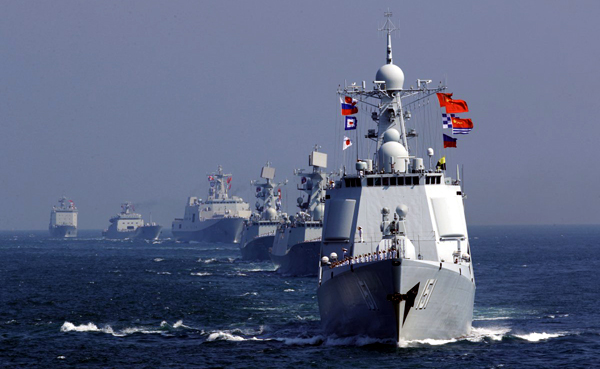 This week’s 70th anniversary of the formation of the Chinese Navy was marked by the arrival of a huge new naval fleet in the Red Sea off Somalia.
This week’s 70th anniversary of the formation of the Chinese Navy was marked by the arrival of a huge new naval fleet in the Red Sea off Somalia.
With the withdrawal of U.S. and U.K. forces from Africa China has stepped in. Chinese warships have provided a safe escort in the Red Sea for more than 6,600 vessels in the last decade, without any further justification required from those vessels than a call for assistance. Only a few years ago it was U.S. and U.K. warships that provided these safe escorts.
“Call us on channel 16 if you need help” is a regular refrain heard by ships sailing today in the Gulf of Aden. Nothing more. It’s broadcast in both Chinese and English.
When the U.K. and the U.S. were conducting such services – both ended by legislatures removing the funding – vessels were hailed for their registration before safe escort was proffered, and then the vessel then had to identify its cargo before the escorting actually began.
Not with the Chinese. The presumption is that any vessel sailing in these troubled waters deserves assistance. It’s an absolute affirmation of Chinese non-interference in non-Chinese interests.
On the other hand it’s a recognition that a growing Chinese trade in Africa must be protected, and that without protection for all the other trade which isn’t Chinese, the task to protect Chinese becomes more difficult.
More to the point, it’s a critical service, especially now that America has withdrawn from Somalia. The several decades of diplomatic and military work America both secretly and overtly pursued in The Gulf has been abandoned. New piracy has begun.
At the height of the Yemen civil war in 2015, it was Chinese ships that evacuated civilians of all nationalities. The effort drew such praise internationally that many believe this is what facilitated the current much larger naval presence in The Gulf. The country is clearly proud of the reputation that it seems to have earned globally.
Quite apart from the global politics of all of this it’s not necessarily good news for Somalia. China’s interests in Africa are not holistic, as had been the western powers’. While it is clearly arguable whether the promulgation of democracy was worthy of the western all-out efforts of coordinated aid and development, the quest for human rights certainly was. Human rights is not a part of the Chinese mission.
Narrowly, gripping tightly to a policy of non-interference, China does what’s good for China. At times like now in the Gulf of Aden where its massive oil vessels hope within the decade to be returning billions of barrels of oil to Asia, calm waters are essentials. Pirates can’t be allowed.
But the Chinese have little interest in the mainland where millions of people are currently on the cusp of losing the huge democratic and human rights gains left them at the end of the last decade mostly because of western foreign policies.
Al-Shabaab has reappeared just as the pirates have. The corruption in Mogadishu has returned to warlord levels. UN Peace Keepers are few and far apart. In a phrase, the stitches meticulously built by the west over the last three decades are unraveling.
The Chinese shrug their shoulders: It was the west that colonized Somalia. It was the west that abandoned colonialization to terrorism in the 1980s. It was the west that tried to put it all back together, again in the last few decades, and now it’s the west that’s abandoning that half (re)-built house.
The place is a mess. Like the Mideast no good is bound to happen. So if I were an up-and-coming terrorist in Somalia I wouldn’t waste any time learning to sail.